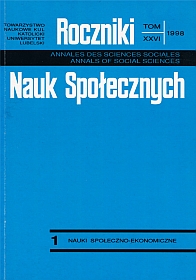Wzajemne relacje między państwem a Kościołem w świetle katolickiej nauki społecznej
Abstrakt
The author deals first with the evolution of mutual relations between the state and the Church in recent times, starting from Leo XIII. In solving these relations, the Pope based himself on a „perfect community,” whereas Pius XII, and later Vatican Council II and John Paul II, refer to the personalistic and communitarian approaches.
Then the author goes on to discuss the state's neutrality as regards outlook and religion. According to the Church's social doctrine, the state should not be identified with any outlook, nor favour any religion as the dominating one. All the groups advocating a particular outlook and all the religions have equal rights to exist and develop. To make one group privileged would be against the others.
Finally, the author depicts two models which show how to solve the mutual relations: the formal and informal models. The former is the concordat between the state and the Apostolic See; the latter model is a spontaneous, good cooperation between the state and the Church for the good of the same citizens who are members of the two communities.
Copyright (c) 1998 Roczniki Nauk Społecznych

Utwór dostępny jest na licencji Creative Commons Uznanie autorstwa – Użycie niekomercyjne – Bez utworów zależnych 4.0 Międzynarodowe.


